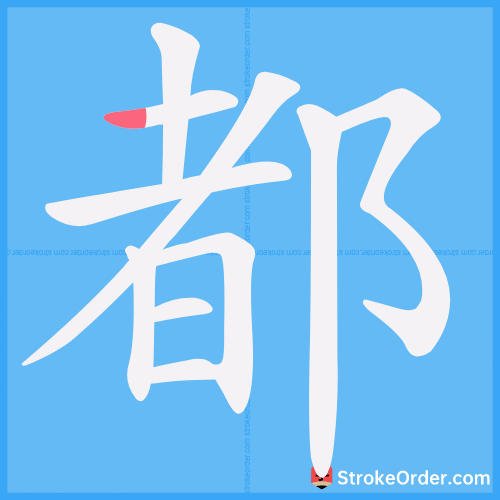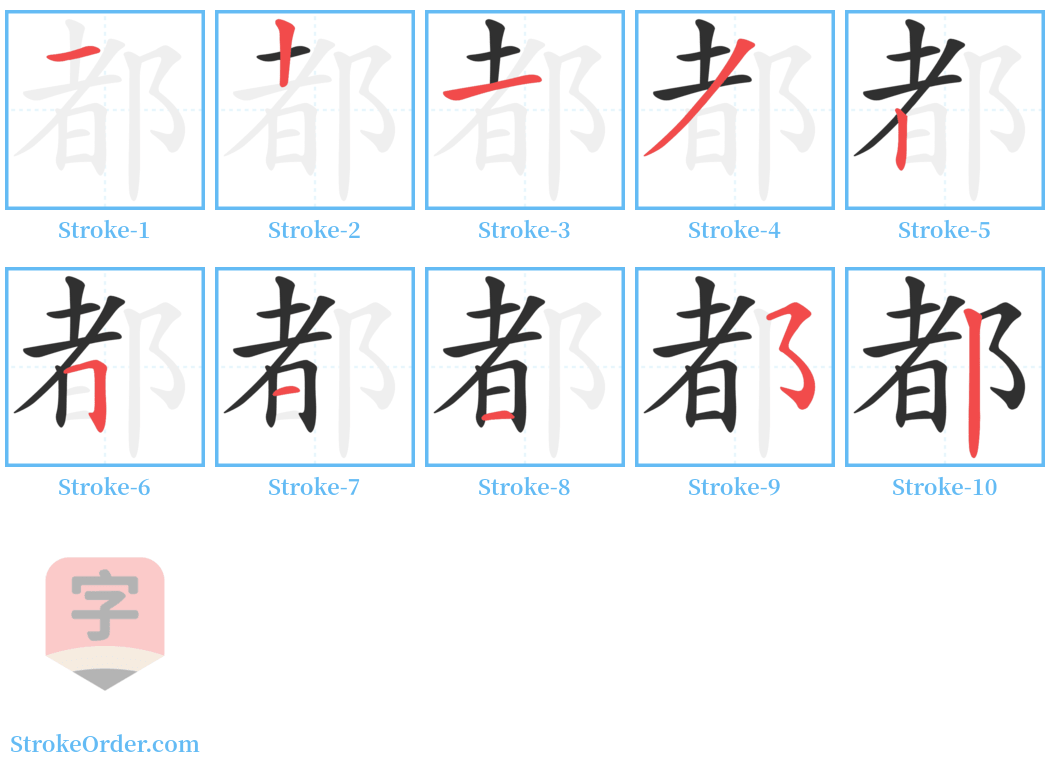都 Stroke Order
Animated Stroke Order of 都

Stroke Order Diagrams for 都

Step-by-Step Handwriting Guide for 都

Learn to Write Chinese Characters with Video Tutorials
Watch the video of writing the Chinese character "都", learn the correct stroke order (笔顺) of the character "都", and master the standard way of writing the character "都".
Free Printable Handwriting Practice with Stroke Order: 都
Printable Writing Practice Worksheet of "都" in Portrait Orientation (Tian Zi Ge)

Printable Writing Practice Worksheet of "都" in Landscape Orientation (Tian Zi Ge)

Information of 都
Pinyin
dōu、 dū
Radical
阝
Strokes
10 strokes
Usage
★★★★★
Definition
all / both (if two things are involved) / entirely (due to)each / even / already, (surname) / metropolis / capital city
Definition of 「都」:
1. 大都市: Big city.
2. 一国的最高行政机关所在的地方,京城: The place where a country's highest administrative office is located; the capital city.
3. 美好: Beautiful.
4. 总: Overall; total.
5. 居: To reside.
6. 古代称头目、首领: In ancient times, referred to chief or leader.
7. 姓: Surname.
Additional meanings:
1. 大都市: Example phrases - ~市 (big city), ~会 (conference), 通~大邑 (a city of many interconnections).
2. 京城: Example phrases - 首~ (capital), 国~ (national capital), 京~ (Beijing's capital), 建~ (establish a capital).
3. 美好: "雍容闲雅,甚~" (magnificently elegant, very beautiful); ~丽 (beautiful); ~雅 (elegant).
4. 总: Example phrase - ~为一集 (to gather as a whole).
5. 居: "~卿相之位" (to hold the position of prime minister).
6. 头目,首领: Head or leader.
7. 唐、五代宋初军队编制单位,以百人或千人为都: In the Tang dynasty, a unit in military organization comprising hundreds or thousands of soldiers.
Verbose meanings:
1. 同本义 (same original meaning) ([En.] capital): In the Zhou dynasty, capitals were referred to as "都", while cities with ancestral temples or spirits of ancestors were called "都"; others were called "邑."
2. 邦国的都城,国都 ([En.] capital): The capital city of a nation; examples include 奠都 (establishing a capital), 定都 (fixing a capital), 故都 (former capital), 国都 (national capital), 京都 (historical capital).
3. 引申为城市 ([En.] big city): Example phrases - 都道 (streets in the capital), 都庄 (major thoroughfares of the capital).
4. 邦国的封地、采地 ([En.] fief;feud): Reference texts discussing the delineation of these territories in ancient governance.
5. 国家或帝国的行政区域或行政分区 ([En.] region;countryside): Arrangements of administrative divisions in historical contexts.
6. 头目,首领 ([En.] head): Examples - 都老 (title for a leader in minority ethnic groups).
7. 军队编制单位 ([En.] hundred persons): Titles indicating military ranks with "都" as a modifier.
8. 吏的俗称 ([En.] official): Names for various official posts in historical Chinese governance.
As a verb:
1. 建都 ([En.] found a capital).
2. 聚集 ([En.] accumulate).
3. 率领 ([En.] command).
As an adjective:
1. 美好的样子 ([En.] elegant).
2. 大 ([En.] great).
As an adverb:
1. 统统,完全 ([En.] all).
2. 另见 dōu - see also.
For dōu:
1. 全,完全 ([En.] all, complete).
2. 表示语气的加重 ([En.] used for emphasis).
Examples of dōu:
1. 全部: Everyone.
2. 表示语气的加重: It won't move at all.
Dujiangyan in Sichuan, a famous water engineering project and World Heritage Site / Dujiangyan county level city in Chengdu 成都[Cheng2 du1], Sichuan
(army) commander-in-chief (archaic) / provincial military governor and civil administrator during the early Republic of China era (1911-1949 AD)
Input Method for 都
Pinyin
dou1
Wubi
ftjb
Cangjie
janl
Zhengma
bmy
Four Corner
47627
Unicode
U+90fd
Same Pronunciation Characters